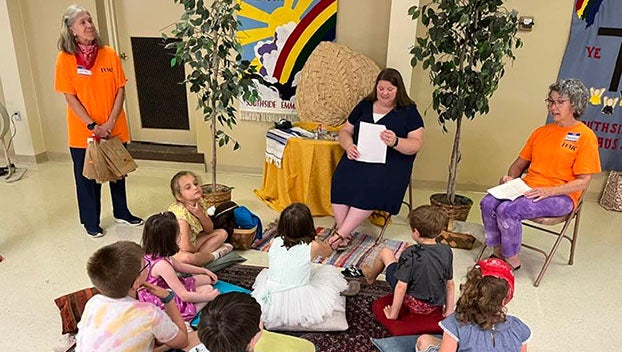Wilsons receive Stewardship Award
Published 11:53 am Thursday, March 31, 2016

- Gen. Sam Wilson, seated, received the Piedmont Soil and Water Conservation District’s Wildlife Stewardship Award certificate from district director and retired Virginia Department of Game and Inland Fisheries’ law enforcement supervisor Bill Powers. The award was for the Wilson’s work to establish wildlife habitat on their property in Rice.
Lt. Gen. Sam Wilson, a three-star general and former president of Hampden-Sydney College, and wife Susi, were awarded the Piedmont Soil and Water Conservation District’s Wildlife Stewardship Award at the district award banquet in February. The couple was unable to attend the ceremony, but they were honored for the wildlife habitat they are in the process of establishing on their property.
The Wilsons manage 100 acres of hardwood forests, fields and ponds located a stone’s throw from the farm where Wilson and his three brothers and a sister were born and raised. Two and a half acres of their property are enrolled in the Conservation Reserve Program (CRP) with Farm Service Agency. In the past this acreage was bushed hogged in rotation to keep woody and invasive species from taking over the field.
Upon the most recent renewal in the CRP program, Mrs. Wilson decided to try something new — work together with Natural Resources and Conservation Service (NRCS) and the Department of Game and Inland Fisheries to create and implement a plan of action that would create a wildlife friendly habitat. The plan called for planting trees and establishing native warm season grasses in and around their understory.
The trees and shrubs in the plan were selected for their wildlife habitat benefits and include chestnut, elm, sourwood, crabapple, serviceberry, hickory, paw paw, hazelnut, chinquapin, elderberry and blueberry. They also protect the tree from animals, wind desiccation and small rodents and insects. These are nine-square-feet mats installed at the base of a tree that allow water to pass through but inhibit the growth of grass and weeds that rob the tree seedling of water and minerals needed to grow.
Native warm season grasses (NWSG) are particularly important for bobwhite quail habitat. NWSGs grow very tall, giving the quail cover from hawks and other predators so that the quail can nest and raise their young. Unlike fescue which grows in an uninterrupted mat, NWSGs grow in bunches giving the quail protected pathways to search for food. Native grasses are natural hosts to many insects, and insects are an essential part of the diet of many birds.
After one year, a year that unfortunately included record drought conditions, the survival rate of the trees was considered acceptable according to NRCS Wildlife Biologist Lorien Huemoller who examined the stand.





